- Wednesday, 14 January 2026
Nepal Health Conclave
An Unfinished Agenda For Reform
In an increasingly connected world, access to health care is largely shaped by political, economic, cultural, historical, and geographical contexts. As a matter of fact, still the health care needs of socially excluded and underserved communities in rural and urban areas are not sufficiently addressed yet. Therefore, the Ministry of Health and Population (MoHP), political parties, development partners, civil society, the private sector, and the diaspora community are working together to improve Nepal’s health systems.
The narratives of health systems are changing in the global context. Apart from scaling up good practices, innovations, and solutions, Nepal clearly needs more investments in the health sector—particularly on human resources, health infrastructure, supplies of drugs and essential equipment, and financing primary health care to achieve universal health coverage and Sustainable Development Goals (SDGs) in the federal context. Despite notable progress, Nepal’s journey to health sector reform is a long way.
The migration and mobility of trained health workers have been a pressing concern. There is a growing demand for health professionals in developed countries. Undoubtedly, while the heroic efforts of the migrant health workforce are much appreciated worldwide, such mobility of health workers is likely to create shortages in the health workforce.
However, diaspora health professionals can bring a wealth of skills and experience back from abroad. Therefore, institutional mechanisms should be put in place to engage them effectively.
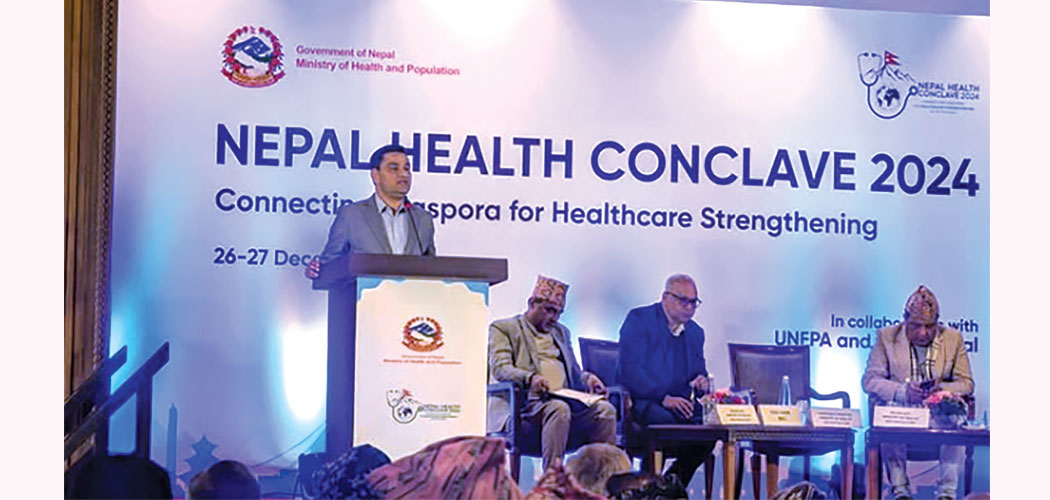
Considering the emerging role of the diaspora community, the MoHP recently convened the Nepal health conclave to discuss and further explore global expertise and national needs and identify collaboration opportunities with the diaspora health professionals. Moreover, the conclave allowed for a more nuanced understanding of the health systems strengthening, as it provided insights into the diverse yet intersecting socio-political, economic, cultural, historical, and programmatic contexts of health care in Nepal, respecting the ideas, concerns, and priorities of all stakeholders.
This important initiative is an exemplary effort of the MoHP that demonstrates Nepal’s broader political leadership in strengthening inclusive health systems, promoting knowledge and technology, widening the scope of the diaspora engagement in health care, and promoting collaboration in research and capacity building and facilitating contributions from the diaspora community. In the changing socio-political context, this platform is necessary to harness the interest and potential of the diaspora community in terms of their potential investments for Nepal’s health sector reform.
On the other hand, the enthusiasm and perspectives of the diaspora community on Nepal’s health care system have been sufficiently embraced during the conclave in terms of existing policy and legal provisions and opportunities for strategic engagement to support critical areas of medical education and health care delivery. In addition, there was an attempt to reflect some of the operational barriers they are facing while initiating some interventions in the country.
Nonetheless, the conclave largely focused on collaboration and partnership opportunities in order to help MoHP in ensuring equitable access to quality health care for all. Appreciating the expertise and recognition of the medical diaspora, Health Minister Pradip Paudel urged key stakeholders to create an enabling environment to explore potential collaboration that facilitates the government’s consistent efforts to strengthen inclusive and resilient health systems in the federal context.
Connecting the medical diaspora community is a great opportunity for collective actions, despite intersecting socio-political, economic, and cultural complexities and limitations. “We are committed to ensuring health sector reform. Therefore, the contributions of the diaspora community are undoubtedly important. We aim to explore new ideas, suggestions, and priorities in terms of effectively mobilising the diaspora health professionals in health care,” said the minister.
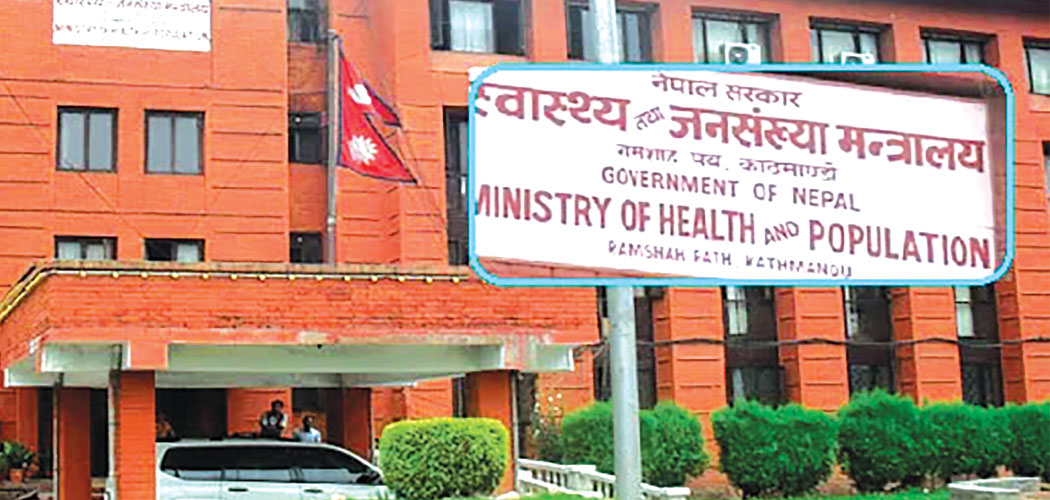
The minister further pointed out Nepal’s enormous progress in the health sector over the decades. Yet there are critical needs to further strengthen health systems in a number of priority areas such as health insurance, human resources, infrastructure, and equipment. Enabling policies and strategic roadmaps for sustainable partnerships with the diaspora community, development partners, and all stakeholders are necessary to reduce existing social inequalities and bottlenecks in health care delivery by promoting multi-sector engagement, solidarity, transparency, and social accountability in the health sector.
“Equitable and resilient health systems have been our immediate priority. This conclave will help outline a guiding framework for effective engagement of the diaspora through partnership and networking between global and local health professionals in order to capitalise on the global expertise, skills, and resources in the health sector,” says Dr. Roshan Pokharel, Secretary of MoHP.
At the core, the conclave has focused on a wide range of thematic areas such as global health policies and practices, health care solutions, e-health, digital health governance, corporate social responsibility, research, education, and innovation in health care.
Additionally, policy dialogues on diaspora engagement are critical to identify the existing gaps, challenges, and opportunities in the globalised world. Achieving the health sector-related Sustainable Development Goals (SDGs) is still challenging as new issues such as climate change, air pollution, urbanisation, migration, and disasters and pandemics such as COVID-19 have adverse health impacts on people and their livelihoods in low-income countries.
Multi-sector engagement in health systems is inevitable. It is high time to identify and prioritise the critical needs and joint actions for health sector reform. “In order to ensure evidence-informed policies and strategic actions, it is crucial to use the evidence from research. As a priority, we need to explore new initiatives in health care that are coherent with national health policies and strategic priorities,” says Dr. Sangeeta Kaushal Mishra, Additional Secretary of MoHP.
The role of the diaspora community is instrumental in addressing health systems-related challenges by sharing knowledge, skills, and practices; capacity building; financial contributions; advocacy for resource mobilisation; technological innovations; and support during health emergencies such as disasters and pandemics.
“Giving an example of Green Tara Nepal, we are supporting community-based health promotion projects and supervising research in Nepal to build local research capacity and generate evidence for actions to improve health systems at large.” says Prof. Dr. Padam Simkhada, who is Associate Dean at the University of Huddersfield, UK.
As a way forward, some strategic actions include mapping of diaspora communities, engaging them in National Joint Annual Review (NJAR) processes, establishing a central platform for identifying needs for investments in the health sector, strengthening knowledge platforms for learning, capacity building through rural health fellowships, and addressing health issues of labour migrants. In addition, there are still hopes of enabling policies, laws, and strategies for increased investments in health care and piloting innovative diagnostic and critical care services in the country.
In summary, it is evident that the diaspora community has shown strong interest and willingness to collaborate in the health sector. However, there is a clear need to establish an effective institutional mechanism in MoHP for overall coordination with the diaspora community and development partners to translate these ambitious priorities and commitments into actions.
Moving forward, it is a praiseworthy initiative that demonstrates Nepal’s strong political leadership for widening the scope of multi-sector engagement for health in the face of the diaspora community, development partners, the private sector, academia, and civil society.
(Bhandari is a health policy analyst and has an interest in anthropology.)



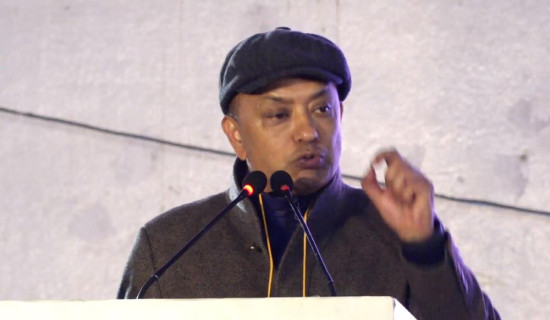
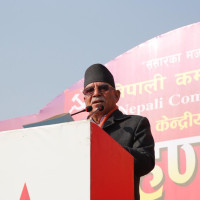
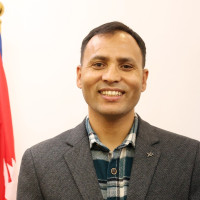
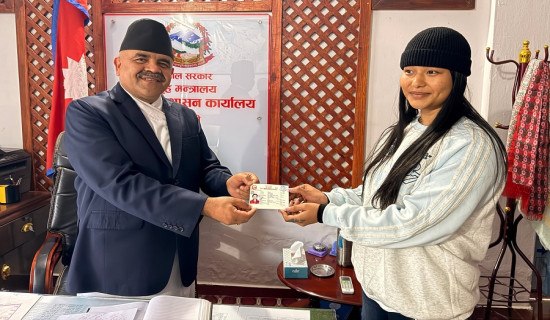
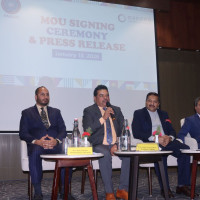
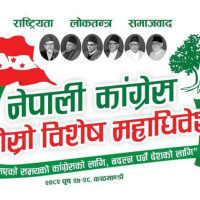
-original-thumb.jpg)







